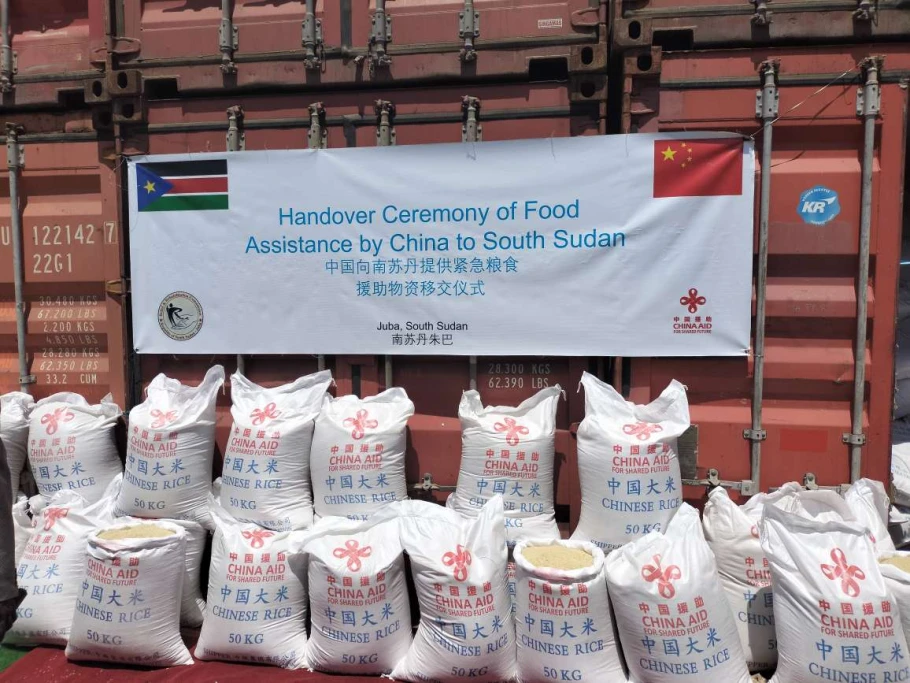
The government of the People’s Republic of China has donated 2,396 tons of Chinese rice to South Sudan as food assistance to the returnees and the most vulnerable people across the country.
Humanitarian agencies estimated that 9.4 million people will require food assistance in 2023. However, the government said this number has been added into by the Sudanese conflict which is causing the return of many South Sudanese who lived in Sudan back to South Sudan.
“The China Rice donation has come at the most critical time in the history of our country. We have the fighting in the Sudan which have caused people who are resident their to come back home in the large number including Sudanese refugees and other nationalities,” said Manase Lomole, Relief and Rehabilitation Commission’s Chairperson on Thursday during the hand over of rice by the Chinese embassy.
“I must underline [that] it’s an indication of the good will from the People Republic of China and indeed, it’s going to the most needy in our country,” Lomole underscored.
The RRC chair said the donation will not only benefit the returnees but also the vulnerable groups such as the disabled, orphans, prisoners and those in the hospitals.
“We will send 65% of the rice to the ten states and three administrative areas, 25% to those who are returning homes either from Sudan or from other parts of the region and 10% will go to the most vulnerable people,” Lomole explained.
Just two years after South Sudan got her independence from Sudan, it dashed into conflict in 2013 and since then, it has continued to face the worst humanitarian crisis coupling with climate change and consecutive 4 years of unprecedented floods in most parts of the country which has led massive displacement continuous poor harvest since 2019.
“We have great number of people in South Sudan who are in need. We have 9.4 [million] people who are in need in 2023 and now the conflict in Sudan have added more because of the influx of all returnees,” said Albino Akol Atak, minster of Humanitarian Affairs and Disaster Management.
Akol said in the distribution of rice, the priority will be given to greater Bhar El Gahzal and Upper Nile who received huge number of the returnees, Sudan refugees and other nationals.
“We will concentrate much on those states where most returnees have come to, [and] with this particular guide, we are talking about Upper Nile in General and Northern Bhar el Gahzal which have a lot of people now coming from Sudan,” Akol narrated.
Sudan crisis started on April 15 when the war broke out in the Sudanese capital -Khartoum between the Sudan armed forces led by the president of the Sudan Sovereign Council Abdel Fatah Al burhan and his deputy Mohamed Hamdan Dagalo who commands the Rapid Support Forces.
The fighting over failed planned integration of forces has claimed more than 700 lives and thousands wounded and according United Nations, more than 700,000 civilians are internally displaced in the last four weeks of fighting.
Sudanese host over 800,000 South Sudanese who ran there during the 2013 conflict and now with the current conflict in Sudan, they are coming back to South Sudan creating the unbearable humanitarian situation the youngest nation.
With its distance from stability, South Sudan is still struggling to implement the 2018 peace agreement which the government signed with the oppositions to address the root causes of the conflict in the country.
The country was supposed to polls in February 2022 but the peace deal reached it deadline with only 27% of its letters implemented and as the result, the parties agreed and extended the transitional period by 24 months in August 2022 in order to complete the implementation of the provisions in the deal.
The implementation matrix called “Roadmap” was developed by the parties to guide the implementation in the 24-month period.
South Sudan now expected to its first ever general elections in December 2024.